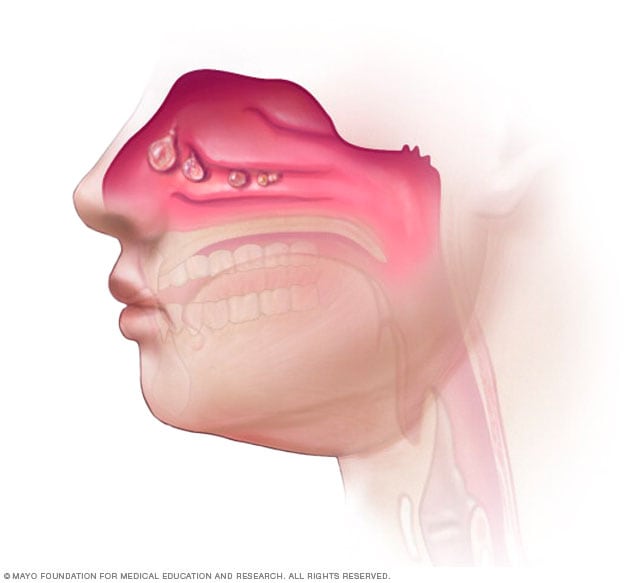Overview
Nasal polyps

Nasal polyps
Nasal polyps are soft growths on the lining of the nose or the spaces inside the nose, known as sinuses. Nasal polyps aren't cancer. Nasal polyps often occur in groups, like grapes on a stem.
Nasal polyps are painless growths inside the nose or the hollow areas inside the bones of the face, also known as sinuses. Nasal polyps aren't cancer.
Small nasal polyps might not cause symptoms. Larger growths or groups of nasal polyps can block the nose. They can lead to breathing problems, not being able to smell and infections.
Nasal polyps can affect anyone. But they're more common in young and middle-aged adults. Medicines can often shrink nasal polyps or get rid of them. But surgery might be needed to remove them. Even after treatment, nasal polyps often come back.
Products & Services
Symptoms
Nasal polyps are linked to irritation and swelling, also called inflammation, of the inside of the nose and sinuses that lasts more than 12 weeks. This is known as chronic sinusitis. But it's possible to have chronic sinusitis without getting nasal polyps.
People who have small nasal polyps might not know they have them. But having more than one polyp or having a large polyp can block the nose.
Common symptoms of chronic sinusitis with nasal polyps include:
- Runny, stuffy nose.
- Mucus running down the throat, also known as postnasal drip.
- Not being able to smell.
- Not being able to taste.
- Facial pain or headache.
- Pain in the teeth.
- A sense of pressure over the forehead and face.
- Snoring.
When to see a doctor
See a health care provider for symptoms that last more than 10 days. Symptoms of chronic sinusitis and nasal polyps are like those of many other illnesses, including the common cold.
Seek medical care right away or call 911 or your local emergency number if you have:
- Symptoms that quickly get worse.
- Seeing double or other vision changes.
- Swollen forehead.
- Pain or swelling around the eyes.
- A bad headache that keeps getting worse.
- Stiff neck.
Causes
Experts don't know what causes nasal polyps. They don't know why some people get nasal polyps and others don't.
Risk factors
Infections, allergies or any condition that causes long-term inflammation in the nose or sinuses can increase the risk of having nasal polyps.
Conditions often linked to nasal polyps include:
- Asthma.
- Aspirin sensitivity.
- Cystic fibrosis.
- Dental infections.
- Lack of vitamin D.
Having a family history of nasal polyps also might increase the risk.
Complications
One of the most common complications of chronic sinusitis with nasal polyps is making asthma worse.
Prevention
The following might help lower the chances of getting nasal polyps or having nasal polyps come back after treatment:
- Manage allergies and asthma. Follow your treatment plan. Be sure symptoms are controlled. See your health care provider if they're not.
- Avoid things that can irritate the nose. These include tobacco smoke, chemical fumes and dust. If you smoke, talk to your health care provider about ways to quit.
- Wash your hands often and well. This is one of the best ways to protect against infections that can cause irritation and swelling of the nose and sinuses.
- Use a machine that adds moisture to the air, known as a humidifier. This might help prevent the nose from getting stuffy and irritated. Clean the humidifier as directed to keep bacteria from growing.
-
Use a nasal rinse. Rinsing the inside of the nose with a saltwater spray or nasal wash might help remove what irritates it.
You can buy saltwater sprays and nasal wash kits without a prescription. Nasal wash kits come with a neti pot or squeeze bottle and directions for how to use them.
Use water that's distilled or sterile or has been boiled for one minute and cooled. The water can also be filtered using a filter with an absolute pore size of 1 micron or smaller. Rinse the pot or bottle after each use with the distilled, sterile, previously boiled or filtered water and leave it open to dry.
Aug. 08, 2023